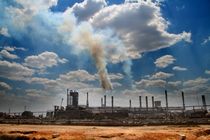Lausanne’s commodities summit puts global transparency and the Swiss trading hub on the agenda
April 1, 2014

Almost 400 participants have been invited by the Financial Times for a two-day conference at the Beau Rivage hotel in Lausanne to compare their “strategies for turbulent times”. Among the invitees are the top executives of the four strongest, highest-selling Swiss companies: Vitol, Glencore, Trafigura and Gunvor. Time and again, allegations of corruption, money-laundering, environmental damage or links to oligarchs and politically-exposed persons (PEPs) have been made against these industry leaders. Notwithstanding this list of sins, today State Secretary Yves Rossier – as representative for Federal President Didier Burkhalter – will praise the particularly business-friendly (read: regulation-hostile) conditions for the world’s most important commodity hub. His basis for this is the totally insufficient Commodities Update Report that was published last week to mark one year since the government released its recommendations for action.
The acute problem of “commodity laundering” is once again entirely ignored in the latest report, despite the issue’s appearance in negative headlines across Switzerland in recent weeks. For example the criminal proceedings against the son of the Ukrainian ex-president, operator of the lucrative Geneva-based coal trading company, Mako Trading, for self-enrichment through the laundering of illegally or illegitimately acquired commodities. In its reports and ongoing research BD has identified dozens of Swiss-registered companies that are directly linked with PEPs from particularly corruption-prone states such as Angola, Nigeria or Gabun. Three complementary measures could significantly reduce the resource curse suffered by these countries: a legal requirement for all Swiss trading companies to publish their payments to governments, a legal requirement for companies to carry out due diligence on their suppliers and business-partners (to combat commodity laundering) and greater transparency with respect to the ownership structures of commodity companies listed in cantonal trade registers.
For further information contact:
Oliver Classen, BD media director, oliver.classen[at]evb.ch, +41 44 277 70 06 (calls diverted to Lausanne)

